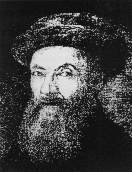

Ah me! What a world this was to live in two or three
centuries ago, when it was getting itself discovered.
-- Alexander Smith
Ferdinand Magellan grew up in an age of discovery. Born in Northern Portugal around 1480, Magellan belonged to a romantic era of the sea during which Bartholomeu Dias rounded the Cape of Good Hope, Vasco da Gama reached India, and Columbus and Vespucci made their historic voyages.
As a young man, Magellan gained maritime experience with Portuguese naval fleets in India, Asia, and the Moluccas (Spice Islands) in Indonesia. Although the war chronicles of that period seldom mentioned his name, he achieved the rank of captain by the time he was 30 years old and became one of the most experienced navigators of his time.
However, when Magellan and other battle-scarred soldiers and sailors returned home to Portugal, they received little thanks for the numerous victories that had brought enormous wealth and prestige to their king and countrymen. Magellan's noble though low-grade birth entitled him to a beggarly allowance, a pompous, meaningless title, and the right to become a loafer at court -- an unbearable situation for a man of honor and ambition.
The first opportunity for renewed military service found Magellan fighting the Moors in Morocco, but that, too, ended in hardship. A lance wound permanently injured his left leg, and an unjust accusation of trading with the enemy scarred his reputation. After King Emanuel of Portugal coolly rejected Magellan's petition for a post within the royal navy, the soldier renounced his loyalty to Portugal and left for Spain.
It was the feverish quest for spices that inspired Emperor Charles V of Spain to financially support Magellan's claim of a western route to the Spice Islands through a seaway near the southern tip of South America. On the gray morning of September 20, 1519, Magellan's fleet of five small ships and a crew of 265 men departed from Sanlucar de Barrameda on an around-the-world voyage. His flagship, Trinidad, was accompanied by Concepcion, San Antonio, Victoria, and Santiago.
From the frigid waters of southern latitudes, through the strait that was to bear his name, Magellan's steely resolve and unyielding perseverance enabled him to face and conquer treacherous seas, dangerous passages, and mutinous crews. Sickness and starvation claimed the lives of 19 men during the 3 months and 20 days Magellan's fleet sailed a sea much broader than expected. Since not one storm was encountered during that period, they named the ocean "Pacific," meaning "peaceful."
Finally, on March 6, 1521, a cry of "Land ho!" boomed from the masthead. Though Magellan had reached what is known today as the Philippines, he knew that the Spice Islands and victory were within easy reach.
But once again, fate delivered its now-familiar decree: Magellan would bear the burdens, but would never enjoy the fruits of success. A single act of poor judgment caused the downfall of Ferdinand Magellan. He was fatally wounded on April 27, 1521, after becoming involved in a dispute between warring Philippine tribes. It was an ironic ending for one who had survived an expedition that had unceasingly taxed his intellect and intuition, a man whose character was so strikingly identified by caution and foresight.
Only one ship, the Victoria, and 18 of the original crew members returned to Spain, thereby completing the first circumnavigation of the globe. Though Magellan's route proved impractical for the spice trade, his voyage has been called the greatest single human achievement on the seas. He was never granted the dazzling fame bestowed on other explorers of the period, but Ferdinand Magellan's legacy changed man's understanding of his world.
 Chapter 7 - The Science Investigators
Chapter 7 - The Science Investigators
![]() The Magellan's Venus Explorer Guide
The Magellan's Venus Explorer Guide

